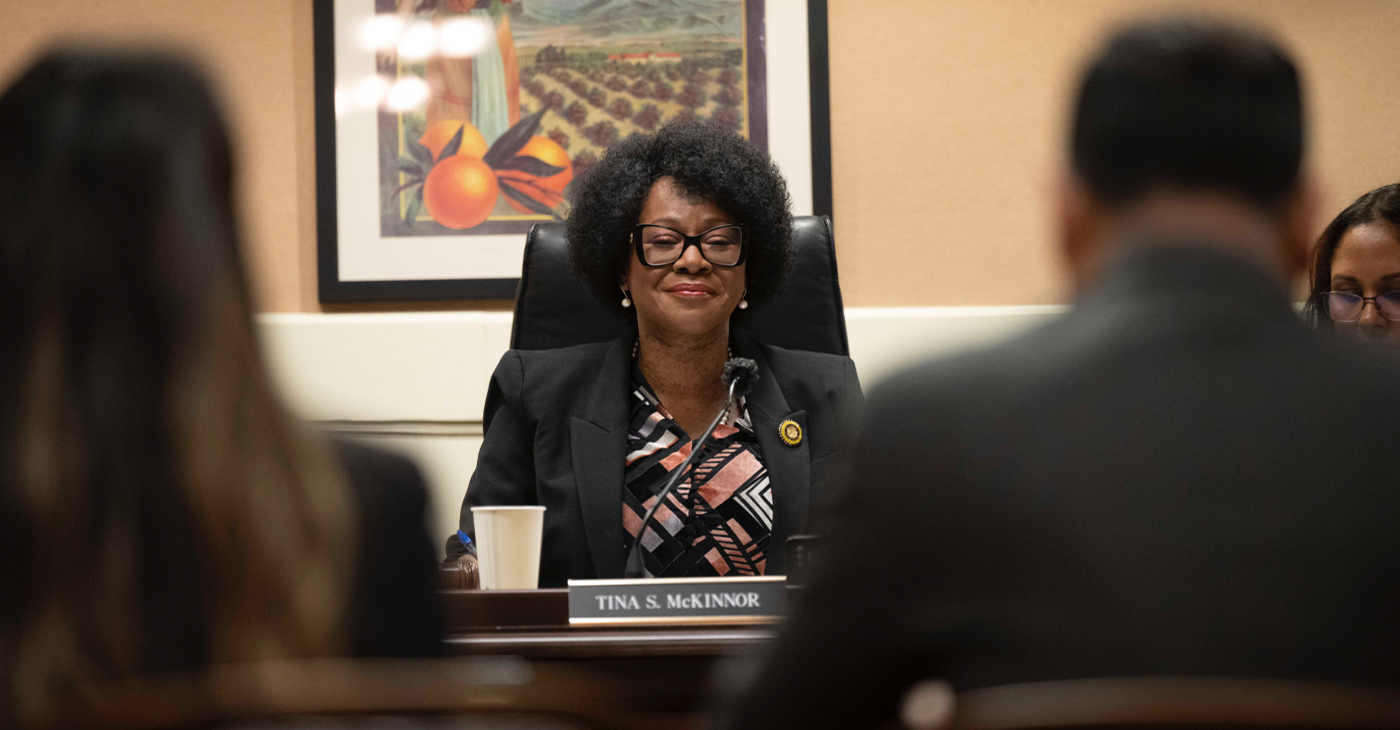California Black Media
Bullying in California: In Some School Districts, Black Students are Targeted by Their Latino Peers
On Feb. 16, 2022, a Black student in the Santa Barbara Unified School District was assaulted by Latino students. His attackers called him the N-word and kneeled on his neck while repeatedly chanting the name “George Floyd.” A district-wide acknowledgment of the hate crime was sent six days later. Despite the psychological trauma this student experienced, the school did little to provide him with mental health support.

By Edward Henderson
California Black Media
On Feb. 16, 2022, a Black student in the Santa Barbara Unified School District was assaulted by Latino students. His attackers called him the N-word and kneeled on his neck while repeatedly chanting the name “George Floyd.” A district-wide acknowledgment of the hate crime was sent six days later.
Despite the psychological trauma this student experienced, the school did little to provide him with mental health support.
Connie Alexander-Boaitey, the president of the Santa Barbara branch of the NAACP, says African Americans are often minimized in her city due to being the smallest demographic group.
Alexander-Boaitey spoke during an Oct. 27 news briefing hosted by Ethnic Media Services on school bullying.
She was joined by Becky L. Monroe, the deputy director of strategic initiatives and external affairs at the California Civil Rights Department; Dashka Slater, an award-winning journalist and author who has written books about child bullying victims; and Mina Fedor, a young Asian American activist who founded the organization AAPI Youth Rising.
Alexander-Boaitey said the hate crimes and incidents affecting children are all connected to “generational pain” for Black Americans. Primarily, there is “a pervasive calling of the N-word by young Latino students,” she said. “It’s every day. It’s weekly.”
She said that a Black family in Santa Barbara now walks their child to school to protect her from bullying classmates, and another has pulled their daughter out of the school system completely, opting for homeschooling.
The Santa Barbara Unified School District commissioned a survey titled “2023 Anti-Blackness and Racial Climate Assessment and Analysis” that proposed a set of recommendations for addressing the problem.
The hate incidents targeting African American children are increasing across California, according to the NAACP. These incidents, often involving physical violence and verbal abuse, are more frequent as Black families relocate to predominantly Latino neighborhoods.
In Santa Barbara, African Americans make up only 2% of the population but account for the most victims of bullying and hate crimes in the area. At 47.5%, Latinos make up the majority of Santa Barbara’s population followed by white people at 43.5%. According to the local NAACP branch, most of the perpetrators of the bullying and hate crimes are Latino children.
Alexander-Boaitey says she believes the hate incidents are rooted in historic racism and connected to a general desire to make Black people invisible — expressed through one racially oppressed group pushing out another in an attempt to get closer to whiteness.
According to Dashka Slater, 3 in 4 Americans of ages 15 to 25 have run into extremist content online. One in four students between the ages of 12 and 18 have seen hateful graffiti in their schools. About 1.3 million students were bullied because of some aspect of their identity during the 2018-2019 school year, and half of those children were targeted because of their race.
“Some forms of bullying are, in fact, acts of hate,” said Monroe. “Some acts of hate are crimes, while others are violations of other civil rights laws. Some may be lawful but incredibly harmful, nonetheless. We must recognize the civil rights issues at the heart of this discussion around bullying.”
Monroe also spoke about the state law requiring schools to provide all students with a safe environment free of harassment.
“Schools have a legal obligation to ensure that students are not denied opportunities, treated differently, discriminated against, or harassed because of their race, color, national origin, gender, gender identity, sexual orientation, religion, or disability,” she said.
Studies have shown that students who perpetuate racially motivated bullying don’t necessarily ascribe to racist ideologies but are simply influenced by outside sources or mirroring behavior from their parents or guardians at home.
Alexander-Boaitey says Black and Latino leaders and residents from the area have not formally met yet to resolve tensions brewing between their communities.
“I know this is where the struggle really is,” she added. “We have to actually sit down and have our own conversations. Has it happened? No, it has not happened … What supports it not happening is the erasure culture that says, no, we don’t really need to talk about that, oh, it was just a single incident.”
The state of California provides resources for victims of hate crimes or incidents. Victims or witnesses can report a hate crime or incident https://stophate.calcivilrights.ca.gov/s/
They can also call 833-8-NO-HATE; (833) 866-4283 Monday-Friday from 9 a.m.-6 p.m. or call 211.
This California Black Media report was supported in whole or in part by funding provided by the State of California, administered by the California State Library.
Activism
Oakland Post: Week of April 24 – 30, 2024
The printed Weekly Edition of the Oakland Post: Week of April 24 – 30, 2024

To enlarge your view of this issue, use the slider, magnifying glass icon or full page icon in the lower right corner of the browser window. ![]()
Business
Black Business Summit Focuses on Equity, Access and Data
The California African American Chamber of Commerce hosted its second annual “State of the California African American Economy Summit,” with the aim of bolstering Black economic influence through education and fellowship. Held Jan. 24 to Jan. 25 at the Westin Los Angeles Airport Hotel, the convention brought together some of the most influential Black business leaders, policy makers and economic thinkers in the state. The discussions focused on a wide range of economic topics pertinent to California’s African American business community, including policy, government contracts, and equity, and more.

By Solomon O. Smith, California Black Media
The California African American Chamber of Commerce hosted its second annual “State of the California African American Economy Summit,” with the aim of bolstering Black economic influence through education and fellowship.
Held Jan. 24 to Jan. 25 at the Westin Los Angeles Airport Hotel, the convention brought together some of the most influential Black business leaders, policy makers and economic thinkers in the state. The discussions focused on a wide range of economic topics pertinent to California’s African American business community, including policy, government contracts, and equity, and more.
Toks Omishakin, Secretary of the California State Transportation Agency (CALSTA) was a guest at the event. He told attendees about his department’s efforts to increase access for Black business owners.
“One thing I’m taking away from this for sure is we’re going to have to do a better job of connecting through your chambers of all these opportunities of billions of dollars that are coming down the pike. I’m honestly disappointed that people don’t know, so we’ll do better,” said Omishakin.
Lueathel Seawood, the president of the African American Chamber of Commerce of San Joaquin County, expressed frustration with obtaining federal contracts for small businesses, and completing the process. She observed that once a small business was certified as DBE, a Disadvantaged Business Enterprises, there was little help getting to the next step.
Omishakin admitted there is more work to be done to help them complete the process and include them in upcoming projects. However, the high-speed rail system expansion by the California High-Speed Rail Authority has set a goal of 30% participation from small businesses — only 10 percent is set aside for DBE.
The importance of Diversity, Equity and Inclusion (DEI) in economics was reinforced during the “State of the California Economy” talk led by author and economist Julianne Malveaux, and Anthony Asadullah Samad, Executive Director of the Mervyn Dymally African American Political and Economic Institute (MDAAPEI) at California State University, Dominguez Hills.
Assaults on DEI disproportionately affect women of color and Black women, according to Malveaux. When asked what role the loss of DEI might serve in economics, she suggested a more sinister purpose.
“The genesis of all this is anti-blackness. So, your question about how this fits into the economy is economic exclusion, that essentially has been promoted as public policy,” said Malveaux.
The most anticipated speaker at the event was Janice Bryant Howroyd known affectionately to her peers as “JBH.” She is one of the first Black women to run and own a multi-billion-dollar company. Her company ActOne Group, is one of the largest, and most recognized, hiring, staffing and human resources firms in the world. She is the author of “Acting Up” and has a profile on Forbes.
Chairman of the board of directors of the California African American Chamber of Commerce, Timothy Alan Simon, a lawyer and the first Black Appointments Secretary in the Office of the Governor of California, moderated. They discussed the state of Black entrepreneurship in the country and Howroyd gave advice to other business owners.
“We look to inspire and educate,” said Howroyd. “Inspiration is great but when I’ve got people’s attention, I want to teach them something.”
California Black Media
Asm. Tina McKinnor Elected Chair of L.A. Delegation to Legislature
On Jan. 24, the members of the Los Angeles County Delegation (LACD) to the California Legislature elected Assemblymember Tina McKinnor (D-Inglewood) as the group’s chair. McKinnor, who is a member of the California Legislative Black Caucus, will lead the 39-member body, which is comprised of 15 State Senators and 24 State Assemblymembers representing various areas of Los Angeles County.

By California Black Media
On Jan. 24, the members of the Los Angeles County Delegation (LACD) to the California Legislature elected Assemblymember Tina McKinnor (D-Inglewood) as the group’s chair.
McKinnor, who is a member of the California Legislative Black Caucus, will lead the 39-member body, which is comprised of 15 State Senators and 24 State Assemblymembers representing various areas of Los Angeles County.
As LACD chair, McKinnor succeeds Assemblymember Luz Rivas (D-San Fernando Valley).
“I am grateful for the trust legislators from the Los Angeles County Delegation have placed in me to serve as its next Chair,” said McKinnor in a statement.
LACD Vice Chair, Sen. Maria Elena Durazo (D-Los Angeles), said the body, which collectively represents about 10 million people in California’s populous county, is the largest, bi-partisan, and most diverse delegation in the California Legislature.
“Heading into a challenging budget year, the Delegation, and I will be intensely focused on making sure communities throughout Los Angeles County receive the services they need and that we continue our historic investments to address homelessness and the housing affordability crisis in Los Angeles County,” Durazo added.
McKinnor thanked Rivas for her stewardship of the LACD during the last legislative session.
“The Delegation and I are grateful to outgoing Chair, Assemblymember Luz Rivas, for her incredible leadership to the Legislature, the state, and especially the people of Los Angeles County,” said McKinnor.
-

 Activism4 weeks ago
Activism4 weeks agoOakland Post: Week of March 27 – April 2, 2024
-

 #NNPA BlackPress4 weeks ago
#NNPA BlackPress4 weeks agoBeloved Actor and Activist Louis Cameron Gossett Jr. Dies at 87
-

 Community1 week ago
Community1 week agoFinancial Assistance Bill for Descendants of Enslaved Persons to Help Them Purchase, Own, or Maintain a Home
-

 Activism3 weeks ago
Activism3 weeks agoOakland Post: Week of April 3 – 6, 2024
-

 Business2 weeks ago
Business2 weeks agoV.P. Kamala Harris: Americans With Criminal Records Will Soon Be Eligible for SBA Loans
-

 Activism2 weeks ago
Activism2 weeks agoOakland Post: Week of April 10 – 16, 2024
-

 Community2 weeks ago
Community2 weeks agoAG Bonta Says Oakland School Leaders Should Comply with State Laws to Avoid ‘Disparate Harm’ When Closing or Merging Schools
-

 Community7 days ago
Community7 days agoOakland WNBA Player to be Inducted Into Hall of Fame






















































